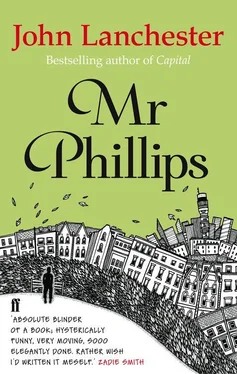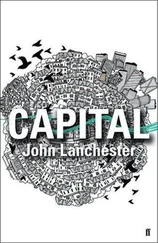Mr Phillips stops across the road from a squat church with a tall spire that looks out of proportion and a scruffy graveyard behind high, spiked black railings. A poster on them advertises Teatime Talks and underneath it, under the heading All Religions Dip Their Buckets Into the Same River, a talk for today, at 3 o’clock, on the subject of ‘What We Can All Learn From Buddhism’. Mr Phillips goes through the open gate and takes the short gravelled path through the graveyard. He is momentarily startled when he glances to his right and sees what looks like a dead body lying on the grass. Then he realizes it is a tramp having a snooze. Balanced intact on the tramp’s stomach is an open can of Tennents Super, ready for immediate swigging when he wakes up.
The church porch is suddenly and unexpectedly cool. In fact it’s the least hot place Mr Phillips has been in all day. The noticeboard is fronted in green felt and has the words Holy Trinity written across the top in fading gilt. It holds announcements about drug rehabilitation, a flower arranging roster, a list of names in a prayer chain, whatever that is, and a notice of the sequence of services and evensongs, along with the liturgy to be used. To Mr Phillips, cradle though lapsed Catholic, these are an exotic touch, something he never got used to about the Church of England, where the language might be either rollingly archaic or as flatly modern as a leaflet from the Inland Revenue.
Churches don’t mean much to Mr Phillips. He doesn’t find anything odd about that. An extraterrestrial would look at the number and apparent importance of churches in Britain, calculate the resources that must have been devoted to building them, and come up with a hugely wrong estimate of their importance in the national life. Both the Phillips boys were brought up nominally Catholic as a way of getting into St Francis Xavier, the local not-bad Catholic school. Religion per se isn’t something to which any of the family — certainly not Mrs Phillips, an unimpassioned but lifelong atheist — gives a great deal of thought.
The heavy, thick oak door into the church proper is half open, and Mr Phillips squeezes through into the main body of the building. Like all churches, presumably because they are always empty, it feels bigger on the inside than the out. Plain glass windows along both aisles admit some light but not much; the high fluorescent tubes add a sense of epileptic flicker but little else. Towards the altar, orange plastic stack-able chairs — which is what the church has instead of pews — have been arranged in a semicircle for a dozen or so people to sit and listen to a man who sits opposite them. One of the people sitting in this half moon of chairs, a cross-looking middle aged woman wearing a duffle coat, turns and glares at Mr Phillips for three seconds until her expression suddenly switches to a full-wattage smile. She looks as if she has been appraising the likelihood that he is a burglar or beggar and has decided that he isn’t. Then she turns back to the speaker. Luckily, at this range Mr Phillips can’t hear what he is saying.
The main body of the nave is empty, with chairs stacked tee-teringly high against the two walls. It creates a curious sense of exposure; there are no pews to duck into, no copies of the Alternative Service Book to pretend to read. The only distraction is provided by a table at the back of the church, strewn with pamphlets: How to Pray, What Jesus Can Mean to You, Is There a Hole in Your Life ? There is a photocopied leaflet offering a history of the building for 10p and another providing a guided tour. Mr Phillips feels that having come into the church he cannot, especially now he has been spotted, simply turn on his heel and walk away, so he takes a copy of the 10p tour leaflet and pretends to look at the new stained glass window in the middle of the north wall. Its centrepiece is a joky version of Noah’s Ark, with the patriarch afloat in his tiny boat behind a unicorn, a dinosaur and a sort of griffin. Someone paid for this to be done in 1962 by some artist Mr Phillips has never heard of. It is typical of the public art that seems to be scattered about London more or less randomly — the tiny blob-like Henry Moore sculpture just around the corner from Wilkins and Co., monuments to generals no one has ever heard of, all that. Meanwhile the city is inhabited by people 99.999 per cent of whom will never have a monument built to them, and who know it, and who repay the compliment by ignoring all the monuments and memorials to toffs and nobs and heroes and famous victories.
Mr Phillips is now within earshot of the talk.
‘… so that there’s a sense, a very real sense,’ the earnest man in the centre of the group is saying, ‘in which the idea of reincarnation is a Christian idea, the embodiment of those responsibilities to all living things that St Francis taught, and the idea of, you know, stewardship, so that if you go around thinking that cows and lizards and even, sort of, ants are people too, in a sense, then you won’t sort of step on them or whatever it is.’
This appears to have been the climactic part of his talk. He stops speaking, slumps back into his seat and looks around the group with a bright expression. There is a silence and a shuffling. Mr Phillips’s least favourite part of any discussion or talk or meeting, from the PTA at St Francis Xavier’s to the weekly accounts overview session at Wilkins and Co., is precisely this point, when people look at their shoes or rearrange their paperwork and pray that someone will say something, ask something, do something. It is as if everyone in the room simultaneously and immediately becomes intensely self-conscious. As he stands still, and the chill of the stone floor begins to seep up through his shoes, he is aware of how much his feet hurt, a stinging ache that he hasn’t felt for years.
‘Niceness is so important, isn’t it?’ says the woman who glared at Mr Phillips. She has a bright, well-bred, carrying voice. There is not quite a murmur of agreement, but a shuffling and grunting and grinning. The man who gave the talk nods enthusiastically.
‘That’s so true,’ he says. But this intervention hasn’t been pitched at the right level and the silence descends again. Mr Phillips feels pinned down as if by a sniper, since if he begins walking his echoing footfall will be by far the loudest noise in the church. The pause is broken by a balding man in a T-shirt, who says in a flat and oddly loud voice, as if he were wearing a pair of earphones and talking at the same time:
‘The thing I don’t understand is, you improve your karma by acting ethically, yes?’
The talk-giver, with what looks like artificial calm, says:
‘We would perhaps say not that you improve your karma but that in a very real sense you are it.’
‘Fine, fine. So we behave well and move up the reincarnation ladder. Be nice to your granny and go up three notches. Be nasty to babies and dogs and move down five notches. Move down enough notches and you’re reborn as a moose or a dragonfly or whatever. Finally you end up as a cockroach. And then you begin to move back up the ladder so that you’re reborn as a human being. Right? That’s the general idea?’
The other man seems less alarmed now. He spreads his hands and says:
‘Very very broadly speaking. I’d suggest that …’
‘OK, OK,’ goes on the flat-voiced man. ‘So let’s say you’re nasty to everyone, you don’t pay your TV licence fee or return your library books, and you’re reborn as a crocodile. You’ve been a bad boy so now you’re a crocodile. There you are in your creek in the Upper Limpopo or whatever. Now here’s my question: how do you improve your karma? How do you behave well? What does an ethical crocodile look like?’
Читать дальше




![Unknown - [Carly Phillips] The Bachelor (The Chandler Brothe(Bookos.org) (1)](/books/174132/unknown-carly-phillips-the-bachelor-the-chandle-thumb.webp)







